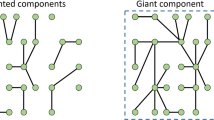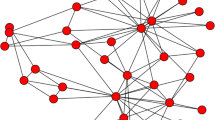Abstract.
We investigate the accumulated wealth distribution by adopting evolutionary games taking place on scale-free networks. The system self-organizes to a critical Pareto distribution (1897) of wealth P(m)∼m-(v+1) with 1.6 < v <2.0 (which is in agreement with that of U.S. or Japan). Particularly, the agent's personal wealth is proportional to its number of contacts (connectivity), and this leads to the phenomenon that the rich gets richer and the poor gets relatively poorer, which is consistent with the Matthew Effect present in society, economy, science and so on. Though our model is simple, it provides a good representation of cooperation and profit accumulation behavior in economy, and it combines the network theory with econophysics.
Similar content being viewed by others
References
V. Pareto, Le Cours d'Économie Politique (Macmillan, Lausanne, Paris, 1987)
A.A. Dragulescu, V.M. Yakovenko, Physica A 299, 213 (2001)
S. Moss de Oliveira, P.M.C. de Oliveira, D. Stauer, Evolution, Money, War and Computers, edited by B.G. Tuebner (Stuttgart, Leipzig, 1999)
Y. Fujiwara, W. Souma, H. Aoyama, T. Kaizoji, M. Aoki, Physica A 321, 598 (2003)
M. Levy, S. Solomon, Physica A 242, 90 (1997)
Econophysics of Wealth Distributions, edited by A. Chatterjee, S. Yarlagadda, B.K. Chakrabarti (Springer-Verlag, Milan, 2005)
A. Chakrabarti, B.K. Chakrabarti, Eur. Phys. J. B 17, 167 (2000)
A. Dragulascu, V.M. Yakovenko, Eur. Phys. J. B 17, 723 (2000)
R. Fischer, D. Braun, Physica A 321, 605 (2003)
Y. Wang, N. Ding, L. Zhang, Physica A 324, 665 (2003)
A. Chatterjee, B.K. Chakrabarti, S.S. Manna, Physica A 335, 155 (2004)
N. Xi, N. Ding, Y. Wang, Physica A 357, 543 (2005)
J.P. Bouchaud, M. Mézard, Physica A 282, 536 (2000)
F. Slanina, Phys. Rev. E 69(4), 046102 (2004)
D.J. Watts, S.H. Strogatz, Nature 393, 440 (1998)
A.L. Barabási, R. Albert, Science 286, 509 (1999)
R. Albert, A.L. Barabási, Rev. Mod. Phys. 74, 47 (2002)
F.C. Santos, J.M. Pacheco, Phys. Rev. Lett. 95, 098104 (2005); F.C. Santos, J.F. Rodrigues, J.M. Pacheco, Proc. Roy. Soc. London B 273, 51 (2006)
R. Albert, A.L. Barabási, Phys. Rev. Lett. 85, 5234 (2000); L.A.N. Amaral, A. Scala, M. Barthélémy, H.E. Stanley, Proc. Natl. Acad. Sci. U.S.A. 97, 11149 (2000)
A.L. Barabási, H. Jeong, E. Ravasz, Z. Néda, A. Schubert, T. Vicsek, preprint arXiv:cond-mat/0104162 (2001)
F. Liljeros, C.R. Edling, L.A.N. Amaral, H.E. Stanley, Y. Aberg, Nature (London) 411, 907 (2001)
H. Gintis, Game Theory Evolving (Princeton University, Princeton, NJ, 2000)
A.M. Colman, Game Theory and its Applications in the Social and Biological Sciences (Butterworth-Heinemann, Oxford, 1995)
M. Nowak, K. Sigmund, Nature (London) 355, 250 (1992)
M. Nowak, K. Sigmund, Nature (London) 364, 1 (1993)
M. Nowak, R.M. May, Nature (London) 359, 826 (1992); Int. J. Bifurcation Chaos Appl. Sci. Eng. 3, 35 (1993)
C. Hauert, M. Doebeli, Nature 428, 643 (2004)
J.M. McNamara, Z. Barta, A.I. Houston, Nature 428, 745 (2004)
R.K. Merton, Science 159, 56 (1968); ISIS 79, 606 (1988)
M. Bonitz, E. Bruckner, A. Scharnhorst, Scientometrics 40, 407 (1997); M. Bonitz, Scientometrics 64, 375 (2005)
D.F. Brewer, Physics Today 44, 154 (1991);
R.H. Wade, Inter. J. Health Services 35, 631 (2005)
G. Szabó, C. Töke, Phys. Rev. E 58, 69 (1998)
G. Szabó, C. Hauert, Phys. Rev. Lett. 89, 118101 (2002)
G. Szabó, J. Vukov, Phys. Rev. E 69, 036107 (2004)
Author information
Authors and Affiliations
Corresponding author
Rights and permissions
About this article
Cite this article
Hu, MB., Wang, WX., Jiang, R. et al. A unified framework for the pareto law and Matthew effect using scale-free networks. Eur. Phys. J. B 53, 273–277 (2006). https://doi.org/10.1140/epjb/e2006-00365-8
Received:
Published:
Issue Date:
DOI: https://doi.org/10.1140/epjb/e2006-00365-8




